Nine University of Wisconsin Oshkosh undergraduate students got a firsthand look at issues surrounding international human rights and the refugee crisis in Europe during a two-week, study-abroad trip to France and Germany.
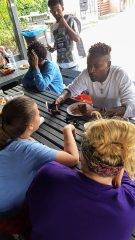 Tracy Slagter, a UWO associate political science professor, led first- and second-year students on the trip as part of a Quest III course that includes community engagement. Mary Reinke, of the UW Oshkosh Office of International Education, found the trip through Customized Education Programs Abroad.
Tracy Slagter, a UWO associate political science professor, led first- and second-year students on the trip as part of a Quest III course that includes community engagement. Mary Reinke, of the UW Oshkosh Office of International Education, found the trip through Customized Education Programs Abroad.
The students were from vastly different majors—kinesiology to supply chain management. Before the trip, they had just had one week of class together on campus to learn about the basics of human rights and current events, including the war in Syria and the refugee crisis.
Providing assistance
Students began their journey by traveling to Strasburg, France—a place Slagter calls a site of the “most powerful human rights institutions in the world.”
By the end of the first week, they were headed to Heidelberg, Germany, to work with people from Syria, Nigeria, the Balkans and many other countries who are seeking political asylum in Germany.
A poster hanging at one of the refugee centers explained that refugees from countries that are deemed “safe,” including the Balkans, Romania and Nigeria, will likely not have their applications for asylum approved. It encouraged those refugees to leave on their own or face deportation. Refugees from Syria, where civil war continues, are likely to have their asylum applications approved and will be allowed to stay in Germany.
Housing the displaced
Slagter explained that there are two main refugee facilities in Germany created from old U.S. military bases. She estimated Patrick Henry Village housed around 1,1,00 refugees and Benjamin Franklin Village in Mannheim housed around 600—though it was in the process of shutting down.
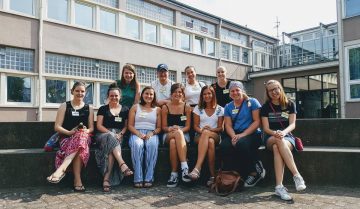
“We saw people walking in with suitcases,” she said.
Germany’s constitution declares it a social welfare state—committed to helping people. But the challenge of handling the influx of people had students wondering what leaders ultimately will do about the situation.
Slagter said the group was fortunate to have visits with high-profile institutions that not many Europeans have access to, including the European Parliament and the Council of Europe, that deal with the refugee crisis.
Providing assistance
The travelers did not know ahead of time the details about the community engagement projects they would be undertaking in Germany.
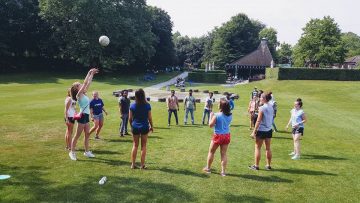
“I told them to keep an open mind and be cheerfully willing to do what they asked us to do,” Slagter said. “The students were amazing at every level.”
Refugees cannot work, do not speak German and constantly fight boredom in the camps—after many survived harrowing journeys on the Mediterranean.
The refugees receive 100 Euros a month (about $115 U.S. dollars.) Many had come from highly populated cosmopolitan areas with careers. Beyond German classes, the refugees have access to a TV room and donated books. Cells phones are the only connection to their families and friends.
To relieve some of the monotony, UW Oshkosh students were asked to put on a barbecue for a group of refugees in a park in Manheim, Germany. The students needed to buy supplies, prepare food and entertain about 40-50 people.
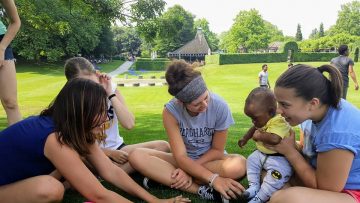
Another day, the students were asked to work with a kindergarten class that included children between the ages of 2 and 6. Suspecting they might be working with children, the students had come prepared by packing bubble wands, dolls, balls and pens.
The only male student on the trip, journalism and public relations major Jake Eckberg, of Green Bay, served as a “human jungle gym,” according to Slagter, with children climbing on him. “They played with the kids and talked with them and hugged them,” Slagter added. “They had a blast. Bubbles were a huge hit.”
Working with the little kids probably left the biggest impact on me, Eckberg.
“Coming into the school with toys for everyone and seeing the smiles on their faces was one of the best feelings I’ve had in a long time,” he said. “It was super cool. All the little boys surrounded me the whole time and Tracy (Slagter) informed me that one of the teachers said they did that because they don’t really have a role model father figure or brother to look up to. So even though I was only there for one day, I felt like I made a significant impact.”
Learning experience
Slagter said the UWO students witnessed how a country deals with a massive influx of people. She noted there are similarities to the situation in the U.S., where leaders must make decisions regarding immigrants.
The students had close interactions with refugees from around the world, both adults and children. They gained insight into the plight of refugees, and the politics of accepting refugees. Decisions must be made on what to do with the refugees and how to pay for them. Slagter said she asked her students to consider if a country has an obligation to accept refugees and how refugees can be integrated into the host country’s society.
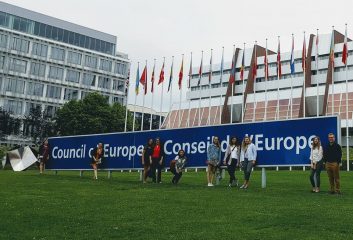
“I want my students to understand that politics is not just talk—what happens in the political world has immediate consequences for real people.”
Beyond the German citizens and refugee families, the crisis is seriously impacting government leaders in the country.
Angela Merkel, chancellor of Germany since 2005, currently is in a fight for her political life over the refugee issue. Some want Germany to stop accepting so many refugees, and others believe it’s the right thing to do.
Merkel has said the country must fulfill its humanitarian obligations to people fleeing war and persecution.
Several days ago, Italy—with its new, anti-refugee government—would not accept a boat full of refugees. The boat was diverted to Spain, where a new, pro-refugee government exists.
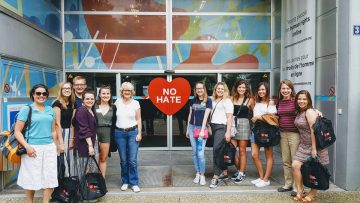 “Refugees are big news,” Slagter said, “and are forcing Europeans to think hard about how to deal with them in large numbers.”
“Refugees are big news,” Slagter said, “and are forcing Europeans to think hard about how to deal with them in large numbers.”
Slagter said she hoped her students would come away from the trip as confident, curious travelers—something they achieved rather quickly.
“It was an awesome experience in every possible way,” Slagter said. “The trip exceeded expectations. I’m writing a lot of thank you cards.”
Learn more:

